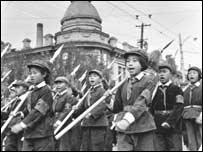A shocking article describes one of madman Kim Jong II’s more gruesome practices (yes, another):
Pregnant North Korean refugees repatriated after being rounded up in China have their babies forcibly aborted or killed after birth, according to a report that adds more horror to what is known of the Stalinist state’s gulags.
Evidence from a number of women who have escaped from the prison camps of the North Korean dictator, Kim Jong-il, reveals a pattern of infanticide, principally due to concern that babies conceived outside the country might not be “ethnically pure”.
The report, by the United States Committee for Human Rights in North Korea, a cross-party monitoring group, cites evidence from eight former inmates.
There has been some debate in the Asian blogs about whether to apply the term “madman” or “lunatic” to tyrants like Kim Jong II or Mao Zedong, some of it quite intelligent and some a little less so. Let me just briefly toss in my two cents, freshly inspried by the above article.
Kim and Mao may not fit the dictionary definition of an insane person in terms of schizophrenia or hallucinations or loss of rational thought processes. In fact, from what I know, I’d say neither can be categorized as insane. But they absolutely were sociopaths in the extreme, megalomaniacs nearly unequalled in all of history (along with Hitler and Stalin, of course), unconcerned with the havoc they wrought, willing to take huge risks that subjected their citizens to unspeakable horrors (like starving to death), and implementors of programs that were utterly lunatic. So to call Kim or Mao or Hitler a “madman” is not, in my book, equal to calling them clinically insane. But to launch such devastating and inexplicable programs like the Great Leap Backward, or to keep your entire population in a state of war a half-century after the real war ended, even though the result is mass starvation and death — I think I am entitled to call these people lunatics and madmen.
This applies to Hitler and Stalin as well, by the way. They didn’t hallucinate. They had functional minds. But if those who brought us the Nazi extermination camp system and the Gulag Archipelago aren’t madmen, then who are the madmen?
Sorry, the shoe fits, firm and snug for Mao, Kim Jong II, Hitler and Stalin. And if the shoe fits….
To reinforce the point a final time here’s another clip from this must-read article:
One 25-year-old woman, Choi Yong-hwa, told the report’s author, David Hawk, a former United Nations human rights investigator, that she was assigned to help pregnant women.
“The woman assisted by Choi was given a labour-inducing injection and shortly thereafter gave birth. While Choi watched in horror the baby was suffocated with a wet towel in front of the mother, who passed out in distress.”
A grandmother who was given a similar job watched seven babies delivered either naturally or as a result of an abortion-inducing drug. All were killed.
Two had survived for two days before a guard “came by, and seeing that two of the babies were not dead yet, stabbed them with forceps at a soft spot in their skulls”.
According to the report, between 150,000 and 200,000 of North Korea’s population of 22 million are held in prison camps. Among their crimes are failing to care properly for photographs of Kim and his father Kim Il-sung, singing South Korean pop songs, and being the offspring of people executed as traitors.
Go ahead and tell us we are not dealing with a state of lunacy here. Go and tell us Kim Jong II shouldn’t be called a “madman.” But as you do, all I ask is that you thank god you live in a country where you can express your thoughts without being tortured, imprisoned and murdered.

Comments